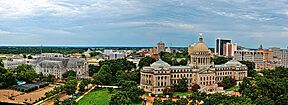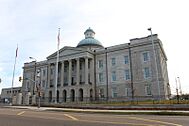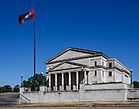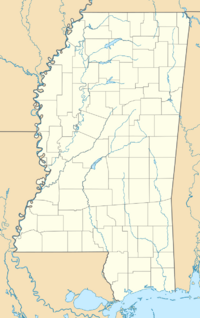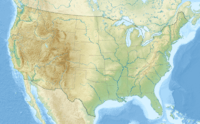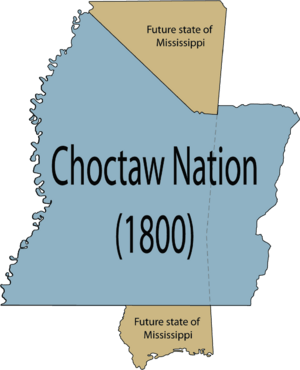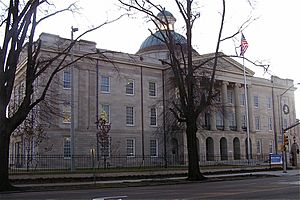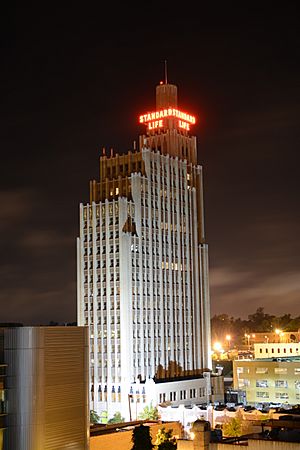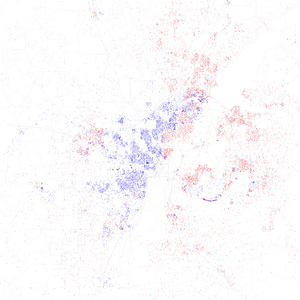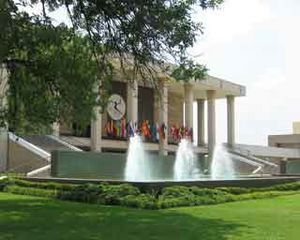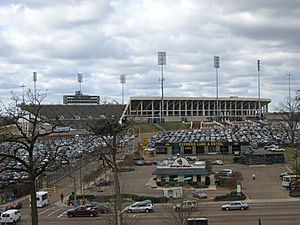Jackson, Mississippi facts for kids
Quick facts for kids
Jackson
|
|||||
|---|---|---|---|---|---|
|
Downtown Jackson
Lamar Life Building
Supreme Court of Mississippi
One Jackson Place
|
|||||
|
|||||
| Motto(s):
The City with Soul
|
|||||
| Country | |||||
| State | |||||
| Counties | Hinds, Madison, Rankin | ||||
| Incorporated | 1822 | ||||
| Named for | Andrew Jackson | ||||
| Government | |||||
| • Type | Mayor–Council | ||||
| Area | |||||
| • State capital city | 113.85 sq mi (294.88 km2) | ||||
| • Land | 111.72 sq mi (289.34 km2) | ||||
| • Water | 2.14 sq mi (5.53 km2) | ||||
| Elevation | 361 ft (110 m) | ||||
| Population
(2020)
|
|||||
| • State capital city | 153,701 | ||||
| • Rank | US: 170th | ||||
| • Density | 1,375.82/sq mi (531.21/km2) | ||||
| • Urban | 347,693 (US: 118th) | ||||
| • Urban density | 1,466.1/sq mi (566.1/km2) | ||||
| • Metro | 591,978 (US: 99th) | ||||
| Demonym(s) | Jacksonian | ||||
| GDP | |||||
| • Metro | .054 billion (2023) | ||||
| Time zone | UTC−6 (CST) | ||||
| • Summer (DST) | UTC−5 (CDT) | ||||
| ZIP Codes |
39201-39213, 39215-39218, 39225, 39232, 39236, 39250, 39269, 39271-39272, 39282-39284, 39286, 39288-39289, 39296, 39298
|
||||
| Area codes | 601/769 | ||||
| FIPS code | 28-36000 | ||||
| GNIS feature ID | 2404779 | ||||
| For additional city data see City-Data | |||||
Jackson is the capital city of Mississippi. It is also the largest city in the state. Jackson is one of two county seats for Hinds County. In 2020, about 153,701 people lived here. This number was a bit lower than in 2010.
Jackson is the main city in the Jackson metropolitan area. This is the biggest city area completely within Mississippi. It is home to more than one-fifth of Mississippi's population. The city is located on the Pearl River. Jackson is the only city in Mississippi with over 100,000 people.
The city was started in 1821 as Mississippi's new capital. It was named after General Andrew Jackson. He was a hero in the War of 1812 and later became the seventh U.S. President. During the American Civil War in 1863, Union forces attacked Jackson. They set parts of the city on fire.
In the 1920s, Jackson grew a lot. It became the most populated city in the state. This happened after natural gas was found nearby. Jackson's current slogan is "The City with Soul." Many famous musicians in blues, gospel, folk, and jazz have come from Jackson. The city is located in the Deep South. It is halfway between Memphis and New Orleans on Interstate 55. It is also between Dallas and Atlanta on Interstate 20.
Jackson has many museums and cultural places. These include the Mississippi Children's Museum and the Mississippi Museum of Natural Science. Other important spots are the Mississippi Coliseum and the Mississippi Veterans Memorial Stadium. This stadium is home to the Jackson State Tigers football team.
Contents
History of Jackson, Mississippi
Jackson has a long and interesting history. It started as a Native American territory. Later, it became the capital of Mississippi.
Early Days: American Indians in Jackson
The area where Jackson is now was once part of the Choctaw Nation. These Native American people had lived there for thousands of years. They spoke the Muskogean language. The Choctaw called this place "Chisha Foka."
In 1820, the United States gained this land from the Choctaw. This happened through the Treaty of Doak's Stand. Many European-American settlers then moved into the area. They began to live on land that still belonged to the Choctaw.
Later, the U.S. government pressured the Choctaw to move. After 1830, most Choctaw moved west of the Mississippi River. They went to what is now Oklahoma. This was part of the Indian removal policy. However, some Choctaw chose to stay in Mississippi. They became citizens of the state and the U.S. Today, many Choctaw in Mississippi are part of the Mississippi Band of Choctaw Indians. They live in communities around the state. The largest is about 100 miles (160 km) northeast of Jackson.
How Jackson Was Founded (Before 1860)
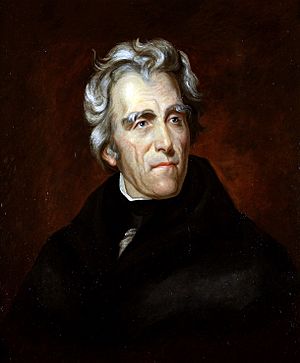
Jackson is located on the old Natchez Trace trade route. This route was first used by Native Americans. The city is also on the Pearl River. The first European-American settler was Louis LeFleur. He was a French Canadian trader. His village became known as LeFleur's Bluff. This spot was a trading post in the late 1700s and early 1800s. It connected to markets in Tennessee.
In 1821, the Mississippi Legislature decided the state needed a new capital. The old capital was in Natchez. They wanted a capital that was more in the center of the state. Three men were chosen to find a good spot. They looked along the Pearl River. They found LeFleur's Bluff.
They reported that this spot was beautiful and healthy. It had good water, plenty of trees, and a river that could be used for travel. It was also close to the Natchez Trace. So, on November 28, 1821, the Assembly chose LeFleur's Bluff as the permanent capital.
The capital city was named after General Andrew Jackson. This honored his victory at the Battle of New Orleans in 1815. He later became the seventh U.S. President.
The city of Jackson was planned in 1822. It was designed in a "checkerboard" pattern. This meant city blocks were planned to alternate with parks. Over time, many of these park spaces were built on. The state legislature first met in Jackson on December 23, 1822. In 1839, Mississippi passed the first U.S. law allowing married women to own their own property.
Jackson got its first public road to Vicksburg and Clinton in 1826. In 1840, it was connected by railroad to other cities. Unlike cities on the Mississippi River, Jackson did not grow much from river trade. But railroads helped it grow a lot after the Civil War.
Jackson During the Civil War (1861–1900)
Even though it was small, Jackson was important for manufacturing during the American Civil War. In 1863, Union forces captured Jackson twice. This happened during the campaign to take Vicksburg.
On May 13, 1863, Union forces won the first Battle of Jackson. Confederate forces had to leave. On May 15, Union troops led by General William Tecumseh Sherman burned and looted important places in Jackson. Jackson was a key center for factories and railroads for the Confederacy. After this, Union forces moved west to Vicksburg.
Confederate forces gathered again in Jackson. They planned to try and break the Union siege around Vicksburg. They built defenses around Jackson. In early July 1863, Confederate forces left Jackson to help Vicksburg. But Vicksburg had already surrendered on July 4, 1863. General Sherman then returned to Jackson.
Union forces began the Siege of Jackson. This lasted about one week. Union forces surrounded the city and began firing cannons. One of their cannon positions is still preserved at the University of Mississippi Medical Center. Another is at Millsaps College. On July 16, 1863, Confederate forces left Jackson at night. They retreated across the Pearl River.
Union forces then burned the city almost completely. Jackson was called "Chimneyville" because only the chimneys of houses were left standing.
Because of the war and fires, few old buildings survived in Jackson. The Mississippi Governor's Mansion, built in 1842, was saved. It was used as Sherman's headquarters. The Old Mississippi State Capitol building also survived. It was the home of the state legislature from 1839 to 1903. The Mississippi legislature voted to leave the Union there on January 9, 1861. The Jackson City Hall, built in 1846, also survived. Some say Sherman spared it because it housed a Masonic Lodge. A more likely reason is that it was used as an army hospital.
After the war, during Reconstruction, there was a lot of unrest. White groups tried to regain power. In 1875, the Red Shirts were formed. These groups worked to remove Republicans from power and stop Black people from voting. Democrats took control of the state legislature in 1876.
In 1890, Mississippi created a new constitution. This constitution made it very hard for most African Americans and many poor white people to vote. They had to pay poll taxes and pass literacy tests. These rules kept Black people out of politics for many years. This lasted until the late 1960s.
The city recovered slowly from the Civil War. In 1871, Jackson started using mule-drawn streetcars. These were replaced by electric ones in 1899. The new Mississippi State Capitol building was finished in 1903. The Old Capitol is now a museum.
Jackson in the Early 1900s (1901–1960)
Famous author Eudora Welty was born in Jackson in 1909. She lived most of her life there. She wrote about the city in her book One Writer's Beginnings. She won a Pulitzer Prize in 1973. The main Jackson Public Library is named after her.
Richard Wright, another famous African-American author, lived in Jackson as a young man. He wrote about his experiences in Black Boy. He described the hard life for African Americans under segregation in the early 1900s.
Jackson grew a lot in the early 1900s. New buildings changed the city's look. The new Union Station showed that many train lines served the city. Railroad jobs brought African Americans from rural areas to the city.
The King Edward Hotel opened in 1923. It was a fancy place for events. The 18-story Standard Life Building was built in 1929. It was the largest concrete building in the world at the time.
Jackson's economy grew more in the 1930s. This was because natural gas fields were found nearby. People started drilling for gas in 1920. By 1930, there were 14 drilling towers in Jackson. This helped the city's economy during the Great Depression. Most of these gas wells closed by 1955.
In 1930, city leaders asked for federal help to stop flooding from the Pearl River. They wanted to straighten and deepen the river.
Jackson's "Gold Coast" Entertainment Area
During Mississippi's long period of Prohibition (when alcohol was illegal), from the 1920s to the 1960s, a lively area called the "Gold Coast" grew. This was on the east side of the Pearl River in Flowood. It had nightclubs and places for entertainment. Many local blues musicians played in these clubs.
The Gold Coast changed after Mississippi allowed alcohol again in 1966. Also, when segregation ended, businesses that served only African Americans lost customers. For example, the Summers Hotel, which opened in 1943, was one of two hotels for Black people. Its Subway Lounge was a popular place for jazz and blues musicians.
In 1990, the state allowed gambling on riverboats. Many casinos opened on riverboats in other towns. Before Hurricane Katrina in 2005, Mississippi was second in the nation for gambling money.
World War II and Beyond
During World War II, Hawkins Field in Jackson became a big airbase. The Royal Netherlands Military Flying School was set up there. It trained Dutch military pilots from 1941.
In 1949, poet Margaret Walker started teaching at Jackson State University. She taught there until 1979. She started the university's Center for African-American Studies. Her work has influenced many writers.
Civil Rights Movement in Jackson
The Civil Rights Movement was very important in Jackson. It worked to end unfair laws that kept Black people from voting and having equal rights.
In 1960, Jackson's population was 64.3% white and 35.7% Black. Public places were separated by race. Black people could not use the same facilities as white people. Efforts to change this began when nine Tougaloo College students tried to read books in a "white only" public library. They were arrested. Tougaloo College, a historically Black college, helped organize students to work for civil rights. It is now a recognized site on the "Civil Rights Trail."
Large protests began on May 24, 1961. More than 300 Freedom Riders arrived in Jackson. They were arrested for "disturbing the peace." These interracial groups rode buses from Washington, D.C. They sat together to protest segregation on public transportation. The Freedom Riders faced violence on their journey. But new people kept joining the movement. They wanted to fill the jails in Jackson with their protest. This brought national attention to the fight for equal rights.
After the Freedom Rides, students and activists organized boycotts, sit-ins, and marches. Businesses often treated Black customers unfairly. For example, department stores would not let Black customers try on clothes in fitting rooms or eat at lunch counters.
On June 12, 1963, Medgar Evers was killed. He was a civil rights leader for the NAACP in Mississippi. He was shot by Byron De La Beckwith, a white supremacist. Thousands marched in Evers' funeral to protest. Parts of U.S. Highway 49, a library, the main post office, and Jackson-Evers International Airport are named after him. In 1994, De La Beckwith was finally found guilty of murder.
In 1963 and 1964, civil rights groups helped Black residents learn about voting. They also helped them register to vote. Black people had been largely prevented from voting since 1890. In 1963, activists quickly registered 80,000 voters across the state. This showed that African Americans wanted to vote.
Segregation and the unfair voting rules for African Americans slowly ended. This happened after Congress passed the Civil Rights Act of 1964 and the Voting Rights Act of 1965. In June 1966, the James Meredith March ended in Jackson. This march, led by James Meredith, aimed to support civil rights. It also helped register between 2,500 and 3,000 Black Mississippians to vote. The march ended on June 26 with a large rally of about 15,000 people in Jackson.
In September 1967, a Ku Klux Klan group bombed the Beth Israel Congregation synagogue in Jackson. In November, they bombed the house of its rabbi, Dr. Perry Nussbaum. He and his congregation had supported civil rights.
Over time, the old barriers came down. Now, both white and African American people in Mississippi vote at high rates. African Americans are the majority in Jackson.
Jackson from the Mid-1960s to Today
In June 1963, the first successful lung transplant from a deceased person was done in Jackson. Dr. James Hardy performed it at the University of Mississippi Medical Center.
Since 1968, Jackson has been home to Malaco Records. This is a leading record company for gospel, blues, and soul music. Many famous artists have recorded there.
On May 15, 1970, police killed two students and wounded 12 at Jackson State University. This happened after a protest against the Vietnam War. These killings were part of national unrest.
Jackson has become a center for medicine and law in Mississippi. This has attracted many Jewish professionals. Since the late 1900s, Jackson has the largest Jewish community in the state.
In 1997, Harvey Johnson, Jr. became Jackson's first African-American mayor. He suggested building a convention center to bring more business to the city. Voters approved this in 2004.
Mayor Johnson was followed by Frank Melton in 2005. Melton was known for his unusual actions. He sometimes acted like a law enforcement officer.
In 2007, Hinds County sheriff Malcolm McMillin also became Jackson's police chief. He held both jobs until 2009. Mayor Frank Melton died in May 2009. Harvey Johnson was elected mayor again in July 2009.
On March 18, 2013, a big hailstorm hit Jackson. It caused a lot of damage to homes and cars. Hail was as big as golf balls and softballs.
On July 1, 2013, Chokwe Lumumba became mayor. He died eight months later, on February 25, 2014. His son, Chokwe Antar Lumumba, ran for mayor but lost to Tony Yarber in April 2014.
In 2013, CN Traveler magazine named Jackson one of the top 10 friendliest cities in the U.S. It was tied with Natchez as Number 7. The city was praised for its friendly people, great food, and pretty public places.
In late August 2022, the Pearl River flooded. This caused flooding in much of the city and affected the water supply. Mayor Lumumba declared a state of emergency. Businesses and schools had to close.
Geography and Climate of Jackson
Jackson is located on the Pearl River. The Ross Barnett Reservoir is northeast of Jackson. It is part of the Pearl River. A small part of Jackson, including Tougaloo College, is in Madison County. Another small part is in Rankin County.
The city covers about 106.8 square miles (276.6 km²). About 104.9 square miles (271.7 km²) is land, and 1.9 square miles (4.9 km²) is water.
Major Highways in Jackson
Jackson is served by several important highways:
Unique Geology: Jackson Volcano
Jackson sits on top of the Jackson Volcano. It is the only capital city in the U.S. with this feature. The top of the volcano is about 2,900 feet (880 m) below the Mississippi Coliseum. The city gets its water from surface water sources.
Jackson's Climate and Weather
Jackson has a humid subtropical climate. This means it has hot, humid summers and mild winters. Rain falls throughout the year. Winter and spring are the wettest seasons. Late summer and early autumn are usually the driest. The city gets about 51 inches (130 cm) of rain each year.
Much of Jackson's rain comes from thunderstorms. Thunder is heard about 70 days a year. Jackson is in an area where severe thunderstorms can happen. These storms can bring large hail, strong winds, and tornadoes. A very strong tornado, the F5 Candlestick Park Tornado, hit on March 3, 1966. It destroyed a shopping center and nearby areas, killing 19 people.
The coldest temperature ever recorded was -5°F (-21°C) on January 27, 1940. The hottest was 107°F (42°C) on August 30, 2000.
| Climate data for Jackson–Evers International Airport, Mississippi (1981–2010 normals, extremes 1896–present) | |||||||||||||
|---|---|---|---|---|---|---|---|---|---|---|---|---|---|
| Month | Jan | Feb | Mar | Apr | May | Jun | Jul | Aug | Sep | Oct | Nov | Dec | Year |
| Record high °F (°C) | 85 (29) |
89 (32) |
95 (35) |
94 (34) |
100 (38) |
105 (41) |
107 (42) |
107 (42) |
107 (42) |
98 (37) |
89 (32) |
84 (29) |
107 (42) |
| Mean daily maximum °F (°C) | 56.1 (13.4) |
60.5 (15.8) |
68.5 (20.3) |
75.9 (24.4) |
83.1 (28.4) |
89.5 (31.9) |
91.6 (33.1) |
91.6 (33.1) |
86.7 (30.4) |
77.2 (25.1) |
67.4 (19.7) |
58.2 (14.6) |
75.5 (24.2) |
| Mean daily minimum °F (°C) | 35.3 (1.8) |
38.5 (3.6) |
45.3 (7.4) |
52.2 (11.2) |
61.6 (16.4) |
68.6 (20.3) |
71.6 (22.0) |
70.9 (21.6) |
64.6 (18.1) |
53.1 (11.7) |
44.0 (6.7) |
37.3 (2.9) |
53.6 (12.0) |
| Record low °F (°C) | −5 (−21) |
1 (−17) |
15 (−9) |
27 (−3) |
36 (2) |
47 (8) |
51 (11) |
54 (12) |
35 (2) |
26 (−3) |
15 (−9) |
4 (−16) |
−5 (−21) |
| Average precipitation inches (mm) | 4.97 (126) |
4.76 (121) |
5.04 (128) |
4.96 (126) |
4.38 (111) |
4.12 (105) |
4.81 (122) |
4.24 (108) |
3.03 (77) |
3.92 (100) |
4.76 (121) |
5.15 (131) |
54.14 (1,376) |
| Average precipitation days (≥ 0.01 in) | 9.8 | 9.8 | 9.4 | 7.9 | 8.9 | 9.4 | 10.7 | 9.9 | 7.0 | 7.6 | 8.6 | 9.6 | 108.6 |
| Average relative humidity (%) | 76.2 | 73.2 | 71.1 | 71.5 | 73.8 | 73.6 | 76.9 | 77.0 | 77.3 | 74.8 | 75.9 | 76.5 | 74.8 |
| Mean monthly sunshine hours | 154.5 | 165.3 | 223.5 | 251.1 | 276.2 | 298.5 | 283.4 | 273.1 | 232.7 | 235.2 | 174.0 | 152.1 | 2,719.6 |
| Percent possible sunshine | 48 | 53 | 60 | 65 | 65 | 70 | 65 | 66 | 63 | 67 | 55 | 49 | 61 |
| Source: NOAA (relative humidity and sun 1961–1990) | |||||||||||||
People and Economy of Jackson
Jackson was a small town for much of the 1800s. Before the Civil War, its population was small. In 1850, only 1,881 people lived there, not counting enslaved people.
By 1900, Jackson still had fewer than 8,000 people. But it grew quickly. By 1944, Jackson had about 70,000 people. It became the largest city in Mississippi. For many years, Jackson had the busiest business areas and the biggest public school system in the state. Its population peaked in 1980 with over 200,000 residents. Since then, Jackson's population has decreased. But the population in its surrounding suburban areas has grown.
Who Lives in Jackson?
| Race / Ethnicity (NH = Non-Hispanic) | Pop 2000 | Pop 2010 | Pop 2020 | % 2000 | % 2010 | % 2020 |
|---|---|---|---|---|---|---|
| White alone (NH) | 50,679 | 31,194 | 25,424 | 27.50% | 17.98% | 16.54% |
| Black or African American alone (NH) | 129,609 | 137,265 | 120,727 | 70.34% | 79.11% | 78.55% |
| Native American or Alaska Native alone (NH) | 213 | 232 | 237 | 0.12% | 0.13% | 0.15% |
| Asian alone (NH) | 1,045 | 660 | 751 | 0.57% | 0.38% | 0.49% |
| Pacific Islander alone (NH) | 18 | 18 | 30 | 0.01% | 0.01% | 0.02% |
| Some Other Race alone (NH) | 128 | 99 | 362 | 0.07% | 0.06% | 0.24% |
| Mixed Race or Multi-Racial (NH) | 1,113 | 1,323 | 2,951 | 0.60% | 0.76% | 1.92% |
| Hispanic or Latino (any race) | 1,451 | 2,723 | 3,219 | 0.79% | 1.57% | 2.09% |
| Total | 184,256 | 173,514 | 153,701 | 100.00% | 100.00% | 100.00% |
In 2010, most people in Jackson were Black or African American. This was still true in 2020. The number of Hispanic or Latino people is growing the fastest in the city.
Jackson's Economy and Jobs
Jackson has several important industries. These include making electrical equipment, processed food, and metal products. The area around Jackson also grows crops like soybeans and cotton. It also raises livestock and poultry.
The biggest employers in Jackson are the University of Mississippi Medical Center and Jackson Public Schools. Nissan North America is also a major employer. Other big companies nearby include C Spire and Amazon.
Jackson is home to Cooperation Jackson. This group helps create businesses owned by their workers. Examples include The Green Team (lawn care) and Freedom Farms (organic farm).
Arts and Culture in Jackson
Jackson has many places for arts and culture. Here are some of them:
- Ballet Mississippi
- Crossroads Film Society (hosts an annual Film Festival)
- International Museum of Muslim Cultures
- Jackson State University Botanical Garden
- Jackson Zoo
- Mississippi Agriculture and Forestry Museum
- Mississippi Arts Center
- Mississippi Chorus
- Mississippi Civil Rights Museum
- Mississippi Department of Archives and History (state archives)
- Mississippi Heritage Trust
- Mississippi Hispanic Association
- Mississippi Metropolitan Ballet
- Mississippi Museum of Art
- Mississippi Opera
- Mississippi Shakespeare Festival
- Mississippi Symphony Orchestra (MSO)
- Municipal Art Gallery
- Museum of Mississippi History
- Mynelle Gardens
- New Stage Theatre
- Russell C. Davis Planetarium
- Smith-Robertson Museum and Cultural Center
- USA International Ballet Competition
Sports in Jackson
Jackson and its surrounding area have college and semi-professional sports teams. The Mississippi Braves are a minor league baseball team. They are connected to the Major League Baseball team, the Atlanta Braves. However, the Mississippi Braves will move to Columbus, Georgia, after the 2024 season. Mississippi Brilla is a soccer team that also plays in the area.
Education in Jackson
Jackson has the most colleges and universities in Mississippi. Jackson State University is the largest college in the city. It is also the fourth largest in the state.
Colleges and Universities in Jackson
- Jackson State University
- Tougaloo College
- Millsaps College
- Belhaven University
- University of Mississippi Medical Center
- Mississippi College School of Law
- Hinds Community College
Public Schools in Jackson
The Jackson Public School District (JPS) runs 60 public schools. It is one of the biggest school districts in Mississippi. It has about 30,000 students. Most students in JPS qualify for free or reduced-price school lunches.
The district's high schools include:
- Callaway High School
- Capital City Alternative School
- Career Development Center
- Forest Hill High School
- Jim Hill High School
- Lanier High School
- Murrah High School
- Provine High School
- Wingfield High School
Some parts of Jackson are in other school districts. These include the Hinds County School District and the Clinton Public School District. The part of Jackson in Madison County is in the Madison County School District.
There are also state-run public schools for special needs:
- Mississippi School for the Blind
- Mississippi School for the Deaf
Private Schools in Jackson
Some private high schools in Jackson are:
- Christ Missionary & Industrial (CM&I) College High School
- Hillcrest Christian School
- Jackson Academy
Some private schools are in nearby towns:
- St. Andrew's Episcopal Middle and Upper School – North Campus (Ridgeland)
- Jackson Preparatory School (Flowood)
- St. Joseph Catholic School (Madison)
- Hartfield Academy (Flowood)
- Madison-Ridgeland Academy (Madison)
- Canton Academy (Canton)
- Tri-County Academy (Flora)
- Central Hinds Academy (Raymond)
- Rebul Academy (Learned)
- East Rankin Academy (Pelahatchie)
Private primary schools include:
- Jackson Academy
- First Presbyterian Day School
- Magnolia Speech School
- St. Andrew's Episcopal Lower School – South Campus
- St. Richard Catholic School
- St. Therese Catholic School
Public Libraries in Jackson
The Jackson/Hinds Library System is the library system for Jackson.
Infrastructure and Transportation in Jackson
In 2015, Jackson's mayor declared a state of emergency for roads and water pipes. Many roads had potholes. Water pipes were breaking after severe winter weather. Fixing these problems was estimated to cost a lot of money. The city asked for help from federal and state governments.
In 2015, 11% of households in Jackson did not have a car. This number went down to 7.6% in 2016. Jackson has a growing number of bicycle lanes.
Jackson–Medgar Wiley Evers International Airport is the busiest airport in Mississippi. It is located east of the city in Rankin County.
Jackson's Union Station serves Amtrak trains. The City of New Orleans train runs daily from Chicago to New Orleans. The station also serves Greyhound Lines buses and Jackson's city buses.
Major Highways in Jackson
Jackson is located where several major highways meet:
Images for kids
-
The Mississippi Governor's Mansion in Jackson.
-
A photograph of Jackson, Mississippi, taken from the International Space Station (ISS).
See also
 In Spanish: Jackson (Misisipi) para niños
In Spanish: Jackson (Misisipi) para niños
 | Selma Burke |
 | Pauline Powell Burns |
 | Frederick J. Brown |
 | Robert Blackburn |


